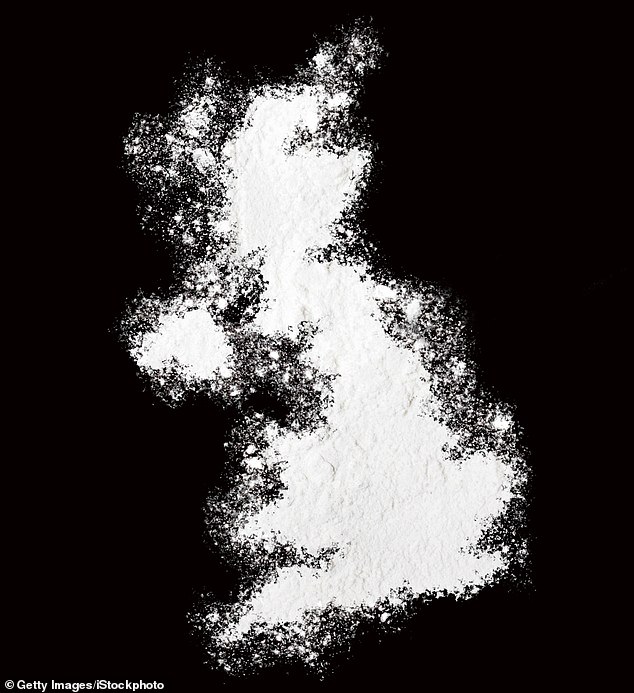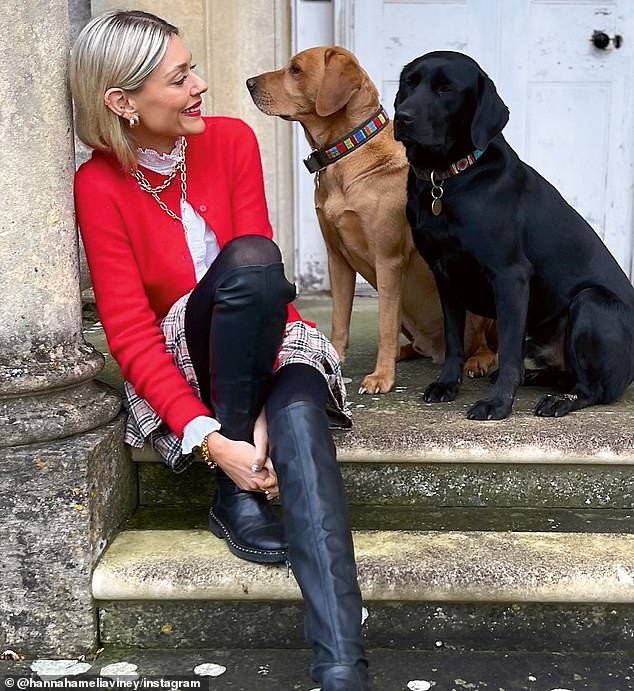When Hannah Viney hit ‘rock bottom’ with her cocaine addiction last year, she was bingeing ‘for three or four days each week and putting drugs before everything else’. Her £124,000-a-year interior design business had failed two years before because she couldn’t keep up with the work. She was making what money she could as a cleaner. ‘By the end, I was using four times a week, going without sleep and food for days at a time. I had extreme exhaustion – I was barely getting through the first two days after each bender – my skin was bad, my hair was falling out. Basically, I couldn’t function.’ Her addiction is far from uncommon. According to the Office for National Statistics, there were 1,118 deaths involving cocaine registered in 2023, 30.5 per cent higher than the previous year.
Viney once crashed her car while sleep-deprived. Most of her relationships in London, where she had lived and worked from the age of 20, had broken down. Her lowest moment came last March: staying at her parents’ Oxfordshire home while they were on holiday, she went on a four-day bender of booze and drugs. ‘I had no other way of dealing with my emotions, other than drugs. It was four days of psychosis and loneliness.’

By the time her brother and cousin found her by chance – they were hosting a dinner at the house – she had passed out in her childhood bedroom. ‘My brother started crying, it was a difficult moment, I still find it hard to speak about.’
Viney was part of a drug-using community in the UK that gets through an estimated 117 tons of cocaine annually (according to the National Crime Agency) and is the biggest market in Europe. But that four-day binge at her childhood home served as a turning point in her drug addiction, and the next day Viney went to her first Alcoholics Anonymous meeting. ‘I eventually started going to Narcotics Anonymous meetings, too. For the first six weeks of my recovery, I barely spoke to anyone. I went to meetings every day. I cried, came home and that was it. Those weeks were hell.’
Viney, now 31, is telling me her story after a year of sobriety. When I meet her on Zoom, she is affable, chatty and beautiful, with high cheekbones and tousled blonde hair. She has also, much to her surprise, become massively popular as TikTok’s cocaine agony aunt, with 155k followers and 2.4 million likes (@hannahameliaviney). She isn’t a trained therapist, though she’s found that it’s her anecdotes and disarming openness that resonate with viewers. ‘I get hundreds of messages each day from people who want to talk about their drug use,’ she says.
Her first video was posted just three months after she got sober. ‘Initially, I started posting because I wanted to show real-time recovery, every single day,’ she explains. ‘I wanted to talk about my experiences, what I was feeling. Having the TikTok feed also helped to keep me accountable. I just never expected it to be so immediately popular.’
The podcast she launched last summer, Class A People – on which she interviews fellow recovering addicts – had 12 million listeners in the first three months of broadcasting; the addiction charity Turning Point has become her first sponsor and she is speaking at Glastonbury Festival this June.

Hannah, 31, who has 155,000 followers on TikTok, has been sober for more than a year
Viney’s drug problem began when she moved to London in 2014 aged 20. She got a job as an estate agent in West London where she was one of the youngest people in an office of 27- and 28-year-olds. Cocaine is so normalised in the capital, she says, it was ‘everywhere’. Trying to fit in at work, she would regularly go to her managers’ houses to do lines of cocaine with her colleagues.
While she would max out her overdraft every month, she’s reluctant to discuss exactly how much she was taking or spending. ‘Something I’ve learnt since getting sober is that it’s unhelpful to other addicts because they might read this and think, “Oh, well,
I don’t do that amount, therefore I’m not an addict” or “I don’t do that, therefore I don’t have a problem.”’ But it was ‘a lot – by the end of my using, I shouldn’t really have survived’. In terms of money, ‘I probably could have bought two houses with the amount I spent,’ she says. Picking up drugs had become second nature. I didn’t even bat an eyelid – didn’t give it a second thought. I saw my drug dealers as my friends.’
Since last summer her life has changed completely. Though she’s living with her parents, the success of her TikTok channel and podcast has given her a sense of purpose. ‘They don’t make loads of money,’ she admits. ‘I make maybe £200 from each podcast sponsorship, and TikTok pays me when my videos do well.’
Followers are drawn by her charisma (her approachable, friendly demeanour reminds me of a young Davina McCall) and the grim fascination of following a person’s sobriety journey in real time. Every video starts with, ‘Hello, my name’s Hannah and I’ve been in recovery from drugs and alcohol for X months…’ Then she goes on to bare all. Since the start of her recovery she has documented her lowest moments in her old life, such as taking cocaine while on a trip with her mum, as well as the challenges of sobriety. There was the friend’s wedding when she struggled as the only teetotal person in a roomful of drinkers: ‘After a point I just didn’t feel part of it… I felt lonely today,’ she told her followers that evening, still dressed in her wedding outfit. Then there was her first Cocaine Anonymous meeting, where she was greeted by a familiar face: ‘I had the same drug dealer for ten years,’ she tells me, ‘and the first day that I walked into Cocaine Anonymous, he was the greeter at the door.’
Distinctly lacking in the evangelism that has become part of much sobriety content – she’s upfront about the fact that sometimes the parties were fun – Viney appeals to users who aren’t quite ready for a 12-step programme. It’s the religious element, she says, that puts off some of her younger followers (many of the steps in AA require a person to relinquish themselves to a higher power). She now hosts weekly Zoom meetings for anyone interested in talking about their substance misuse but not keen to try a traditional programme. ‘There’s no pressure, so people can log on and just listen.
‘People will message me saying, “I don’t want to go to AA, CA or NA because I don’t think I’ve got that big a problem”, so the Zooms are more about finding community, a relaxed space for people to think about their relationship with drugs and alcohol.
‘People would much rather send me a long paragraph on TikTok messenger than talk to a friend or a loved one,’ she says. She thinks the word ‘addict’ is too confronting – but many come to her knowing they have a problem. ‘Society has told us that an addict is a person on a park bench, drinking, with a needle hanging out of their arm. They think, “That’s not me, therefore I’m not an addict.” But then they see one of my videos and it hits a nerve.’
Viney says her biggest regret is the toll her addictions took on her family – something she is working to repair. She grew up in a middle-class family in Oxfordshire, where her parents ran their own business. They were supportive and loving. ‘I feel ashamed of how I treated them – I just wasn’t present,’ Viney says. She would miss family engagements and, when she did show up, acted as if it was a burden to see them ‘because I was always high or dealing with a hangover’.
It was difficult to admit the extent of her problem to her parents. ‘They’ve had questions, and I’ve tried my best to answer them, but it’s been tough on them. No one wants to hear that their child became an addict,’ she says. Viney’s mum has sent her a card every month since she started her recovery. ‘She writes things that she’s noticing about me, which are coming back now that I’m sober.’ In the last one, she said, “You have a sense of purpose. It is a pivotal time for you. Doors are opening. New opportunities are appearing.”’
Viney is now in the process of writing a book. ‘I finally have a sense of peace,’ she says. ‘For the first time in ten years I’m not dealing with a negative voice in my head telling me I’ve f**ked up again, I’ve lost control, I’ve let someone down. I finally feel free.’












